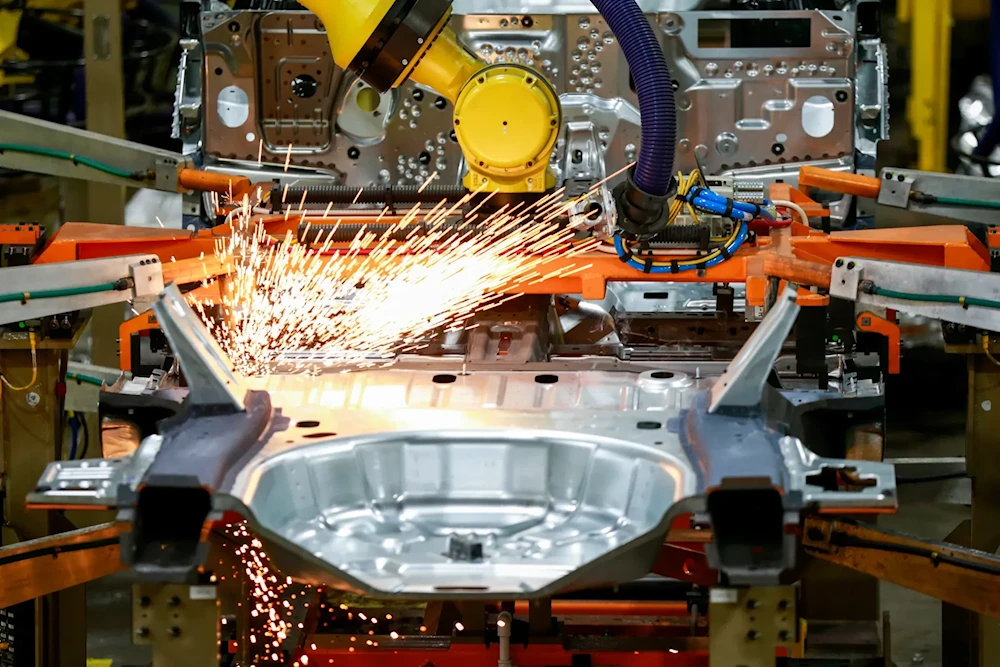How the US lost its place as the world’s manufacturing powerhouse: WSJ
The Wall Street Journal's Justin Lahart explores the decline of US manufacturing and critically examines President Donald Trump's tariff-driven strategy to restore America’s industrial power.
-
 A Ford vehicle assembly line is pictured in this undated photo at Ford’s Chicago Assembly Plant. (Amr Alfiky/AP)
A Ford vehicle assembly line is pictured in this undated photo at Ford’s Chicago Assembly Plant. (Amr Alfiky/AP)
The Wall Street Journal published on Sunday a piece examining the factors that led to the decline of US manufacturing, critiquing US President Donald Trump’s tariff-driven plan to restore America’s industrial strength. Economics reporter Justin Lahart begins by highlighting a stark contrast in the role manufacturing plays in the US economy today compared to the 1950s. Back then, approximately 35% of private-sector jobs in the US were in manufacturing. Today, that number has dwindled to just 9.4%, with only 12.8 million manufacturing jobs remaining.
Trump’s proposed tariff regime, he argues, is aimed at reversing this decline, but economists remain skeptical. Lahart quotes experts who doubt that the tariff plan can restore manufacturing to its former dominance, especially given the broader economic consequences that could outweigh any potential benefits. Economists caution that tariffs may increase prices for consumers and businesses, ultimately reducing spending on other goods and services, including those produced domestically.
The rise of US manufacturing
To understand why US manufacturing lost its dominant position, Lahart provides a historical overview of its rise and fall.
He notes that in the early 1900s, America became a global manufacturing powerhouse through innovations such as interchangeable parts and mass production methods. During and after World War II, the US saw a surge in manufacturing capacity, while other industrial nations were devastated by the war. The postwar economic boom, along with a growing middle class, drove demand for durable goods like cars and appliances, which were produced domestically. This economic growth and industrial prowess were further supported by a highly educated workforce, thanks to the rise of high-school education across the country.
The rise of the service industry
However, by the 1950s, as Americans became wealthier, their spending patterns began to shift.
Lahart quotes economist Susan Helper, who explains that as people “got richer, you can only buy so many cars, and you start buying services.” This shift was reflected in the changing job market, as more people began working in service sectors such as hotels, banks, law firms, and hospitals. Over the next few decades, the share of manufacturing jobs stagnated while service-sector employment continued to rise.
Meanwhile, manufacturing of non-durable goods, like clothing, began moving to the South, where labor costs were lower. But the real global shift occurred when less-developed nations, especially in Latin America and Asia, began ramping up manufacturing. The US started importing more of these goods, and eventually, this trend spread to durable items such as blenders and other household products. By the 1980s, US manufacturers, particularly those producing non-durable goods, found it increasingly difficult to compete with lower labor costs overseas.
'China shock'
The turning point, Lahart argues, came in the 1990s with the rise of China as a global manufacturing power. After China joined the World Trade Organization (WTO) in 2001, it gained unprecedented access to global markets, and its low labor costs made it a formidable competitor for US manufacturing.
Lahart quotes Harvard economist Gordon Hanson, who describes the impact of China’s rise as a “major shift,” noting that "all of a sudden we have substantial production capacity in a low-wage country."
By 2008, China’s exports surpassed those of the US, solidifying its position as the world’s top exporter of goods. The influx of inexpensive Chinese products, particularly in low-tech sectors like furniture and small appliances, was particularly hard on US manufacturers in the South and Midwest.
Hanson, along with economists David Autor and David Dorn, coined the term “China Shock” to describe the economic devastation felt in these regions due to competition from China’s low-cost goods.
Where the US stands now
Today, as China has become a dominant player in global manufacturing, the US has pivoted toward services, particularly in industries like finance, software, and intellectual property.
The Wall Street Journal piece points out that in 2023, the US exported $24 billion in advertising services alone, and its total services exports exceeded $1 trillion—more than any other country. However, Lahart notes that this shift has not been without consequences for American workers.
Research by economists like Hanson and Enrico Moretti shows that in 1980, 39% of high-wage US jobs were in manufacturing. By 2021, that number had dropped to 20%, while the share of high-paying jobs in finance, legal, and professional services grew dramatically from 8% to 26%.
Trump's tarrifs unlikely to reverse the decline
Trump’s tariff plans aim to reverse the decline of manufacturing in the US. Economists are, however, wary of this approach.
Lahart explains that most economists have been arguing against the broad use of tariffs for centuries, with little evidence to support their effectiveness. The fundamental issue, economists argue, is that tariffs lead to higher prices for both consumers and businesses. This, in turn, reduces disposable income and spending power, which outweighs any benefits from increased domestic production or higher government revenues. As economist Gordon Hanson points out, even a 30% increase in manufacturing jobs would only raise manufacturing’s share of private employment to around 12%, still far below its peak.
Instead of relying on tariffs, economists like Susan Houseman suggest that the US should focus on more targeted investments in manufacturing. For example, producing high-tech goods like semiconductors domestically could create jobs and provide long-term economic and military security benefits. However, she cautions against investing in the production of low-cost items such as T-shirts, questioning whether it’s worth the economic cost.
Lahart emphasizes that while Trump’s tariff plan may provide short-term gains for certain manufacturers, it is unlikely to reverse the broader trend of US deindustrialization.

 6 Min Read
6 Min Read









